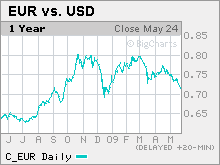Dollar holds gains
Greenback jumps from 5-month low. U.S. consumer confidence up sharply as Germany concerns punish euro.
NEW YORK (Reuters) -- The dollar edged up against the yen Tuesday after data showed improvement in U.S. consumer confidence, while worries about Germany's economy and banks knocked the euro off last week's 4 1/2-month high.
Profit-taking on the euro's recent rise to $1.4055, its highest level since early January, also hurt the currency, but a Wall Street rally and strong U.S. data lifted market sentiment, helping it trade back near $1.40 by late afternoon.
Signs of improved economic growth have kept the dollar under pressure for weeks, but selling reached a crescendo last week when investors started to worry that soaring U.S. deficits could eventually imperil the United States' AAA credit rating.
Fear that foreigners would sour on U.S. government debt eased, though, after a Treasury auction of $40 billion in new two-year notes attracted solid demand.
"The focus on the AAA rating of the United States was overblown and was only a proximate cause of the dollar sell-off last week," said Michael Woolfolk, senior currency strategist at The Bank of New York-Mellon. "We've been seeing a move into risky assets for weeks now. Nothing has really stopped that."
Melvin Harris, market strategist at New York-based Advanced Currency Markets, added: "There's been so much talk about the U.S. rating being downgraded, but to be honest, even if this happened - and I don't think it will - the U.S. is not going to default. That shouldn't be the prompt to sell dollars."
The dollar was last up 0.1% at ¥94.98 after earlier dipping to ¥94.52, according to Reuters data. The euro was down 0.2% at $1.3980 while sterling was flat at $1.5924.
Earlier the euro retreated to $1.3859 after data confirmed Germany's economy shrank in the first three months of the year at its fastest pace since reunification in 1990.
The euro also weakened after a U.K. newspaper quoted Germany's financial regulator as saying German banks' toxic debt could blow up "like a grenade," though a spokesman for the regulator later denied these words were used.
David Powell, a G10 currency strategist at Bank of America-Merrill Lynch in London, said it was all enough to encourage traders to book profits on the euro's rise above $1.40 last week.
Overall, though, analysts said the mood was still relatively upbeat about the recession easing, leaving investors less inclined to need the dollar as a safe haven.
The Australian and Canadian dollars both rose against their U.S. counterpart as oil prices reversed earlier losses and U.S. and European shares closed higher.
That view got an added boost after the Conference Board said its U.S. consumer confidence index rose in May to 54.9 from a upwardly revised 40.8 in April. Economists polled by Reuters had forecast a reading of 42.0 for the May index.
"It's still a case of good news is bad news for the dollar," Woolfolk said.
According to the latest data from the Commodity Futures Trading Commission, speculators increased bets in favor of both the euro and yen against the dollar to multi-month highs.
Those positions are still 11 times below their all-time records, said CMC Markets analyst Ashraf Laidi, suggesting ample room for more dollar selling. ![]()



